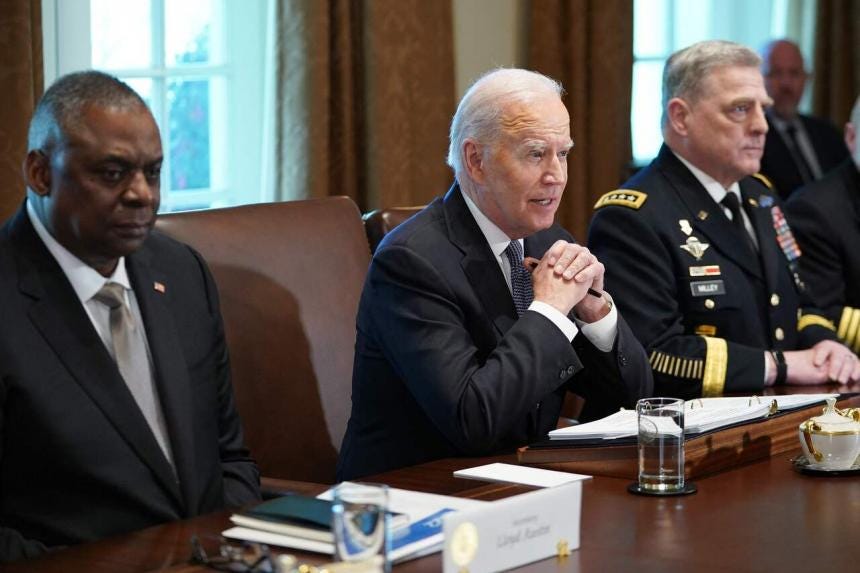Pentagon opposed de-listing Iran Guards if no reciprocal Iranian concession
In U.S. inter-agency debate, 'those against the delisting were DoD and, ultimately, the White House,' senior U.S. official said. 'Israel was not a key factor.'

In recent U.S. inter-agency debate, the U.S. Department of Defense came out against removing Iran’s Islamic Revolutionary Guards Corps (IRGC) from a State Department terror black list if Iran would not agree to a reciprocal non-nuclear concession, such as commit to not target each other’s officials, a senior U.S. official told me.
The issue is believed to be one of the last sticking points to restoring the 2015 Iran nuclear pact, the Joint Comprehensive Plan of Action (JCPOA), which then US President Trump quit in 2018. The Trump administration subsequently added the IRGC to the State Department list of foreign terrorist organizations (FTO) in 2019.
What President Biden committed to doing was a “compliance for compliance deal,” in which the United States would suspend nuclear-related sanctions on Iran if Iran returned to full compliance with the JCPOA, a senior US official told me.
“The Iranians wanted us to remove the IRGC FTO,” the senior U.S. official continued. “And we gave them lots of options for non-nuclear concessions and commitments they could make in return,” the U.S. official said. The Iranians apparently said no.
Iran reportedly has active threats against former American officials in retaliation for the U.S. killing of IRGC Qods Force commander Qassem Soleimani in January 2000.
Iran apparently rejected various proposals, including that it commit not to target each other’s officials in exchange for removing the IRGC FTO listing, lift Iranian sanctions on U.S. Central Command, or agree to follow-on talks on regional issues.
“The ball is in their court,” the US official said. “They have an option to return on a compliance-for-compliance basis.”
“The Defense Department, in particular, was not keen, in the absence of Iran giving a non-nuclear concession, to delist the IRGC,” the U.S. official said. “That is where the president landed.”
The chairman of the Joint Chiefs of Staff, General Mark Milley, told a Senate panel earlier this month that he personally opposed the delisting of the IRGC Qods (or Quds) force, an expeditionary component of the IRGC.
“In my personal opinion, I believe the IRGC-Quds Force to be a terrorist organization and I do not support them being delisted from the foreign terrorist organization [list],” Gen. Milley told the Senate Armed Services Committee in response to a question about the matter on April 7, 2022.
(The Bush administration put the IRGC Qods force on a separate black list, the Treasury Department’s list of specially designated global terrorists (SDGT), in 2007. The Trump administration put the IRGC on the SDGT list in 2017.)
Israel’s vociferous opposition to the delisting of the IRGC from the State Department FTO list was not really a key factor in the US inter-agency debate or decision-making, the U.S. official said.
“Those against [the delisting] were DoD and, ultimately, the White House,” the official said. “Israel was not a key factor.”
Israel has been pressing for the White House to publicly reject Iran’s IRGC delisting request, I reported last week.
Israeli Prime Minister Naftali Bennett raised the issue in a phone call with President Biden on Sunday (April 24), according to the Israeli readout of the call, though the White House readout did not explicitly mention it.
"I am sure that President Biden, who is a true friend of Israel and cares about its security, will not allow the IRGC to be removed from the list of terrorist organizations,” Bennett said in an Israeli readout of the call. “Israel has clarified its position on the issue: The IRGC is the largest terrorist organization in the world."
Israeli and American national security teams led by Israel National Security Advisor Dr. Eyal Hulata and US National Security Advisor Jake Sullivan are meeting at the White House today and tomorrow (April 25-26).
Unclear how to get past the impasse
By mid-March, after a year of talks, European Union-coordinated talks in Vienna had basically reached a draft deal on restoring the nuclear deal, save for a few non-nuclear related issues, including this one.
EU coordinator Enrique Mora subsequently traveled to Iran and then Washington to try to advance a solution, but the process seems stuck.
One factor that may be contributing to the sense the Iranians have dug in on this issue is they might have previously understood from interlocutors at the talks that the FTO issue was on the table.
EU foreign policy chief Josep Borrell, in a phone call with Iranian Foreign Minister Hossein Amir-Abdollahian on Friday (April 23), reportedly said the long break in the Vienna talks was not constructive and called for fresh talks between Mora and Iran’s negotiator Ali Bagheri-Kani, Iranian media reported.
“The Biden administration should have the audacity to rectify the White House’s past mistakes,” Amir-Abdollahian reportedly told Borrell in the call, according to Iranian Press TV.
An Iranian official, speaking not for attribution, did not suggest Iran had any ideas for moving past the impasse.
“Messages are going back and forth through the EU,” the Iranian official told me April 21. “However, if the US insists on its position, things will be complicated. And I don’t know how we can untie the knot.”
**
**


